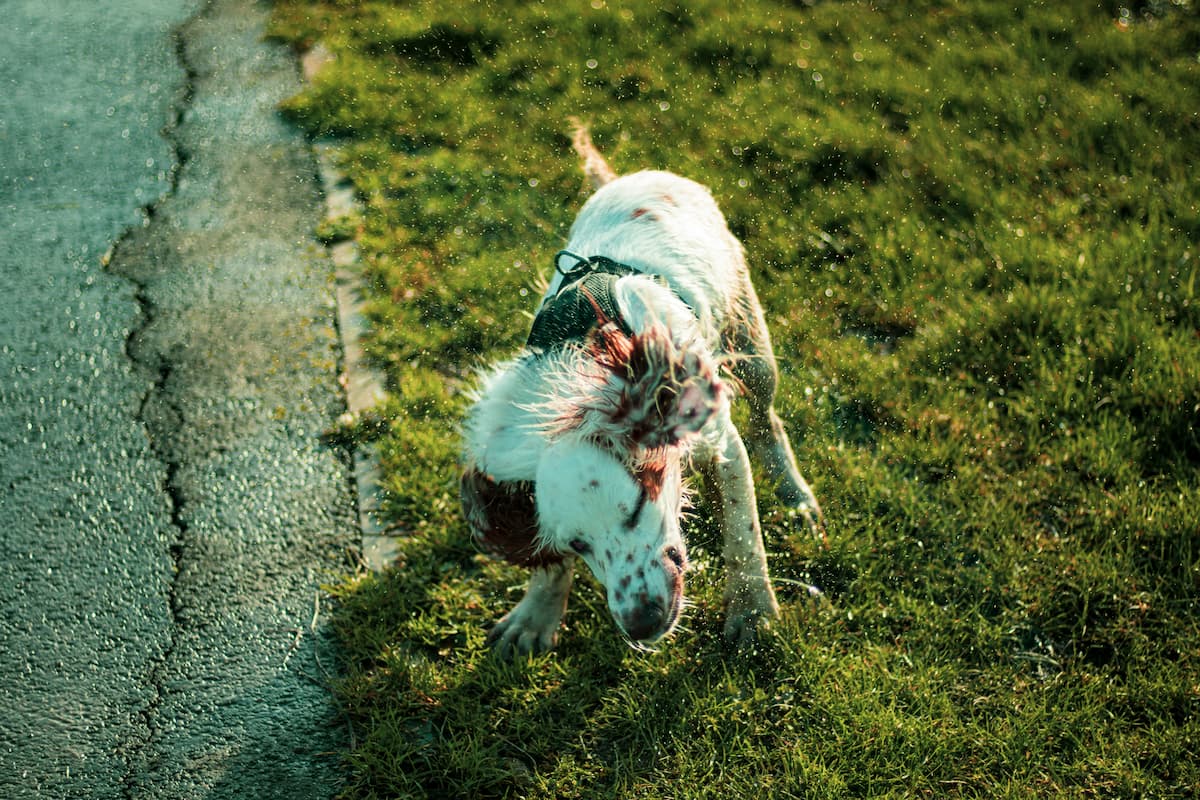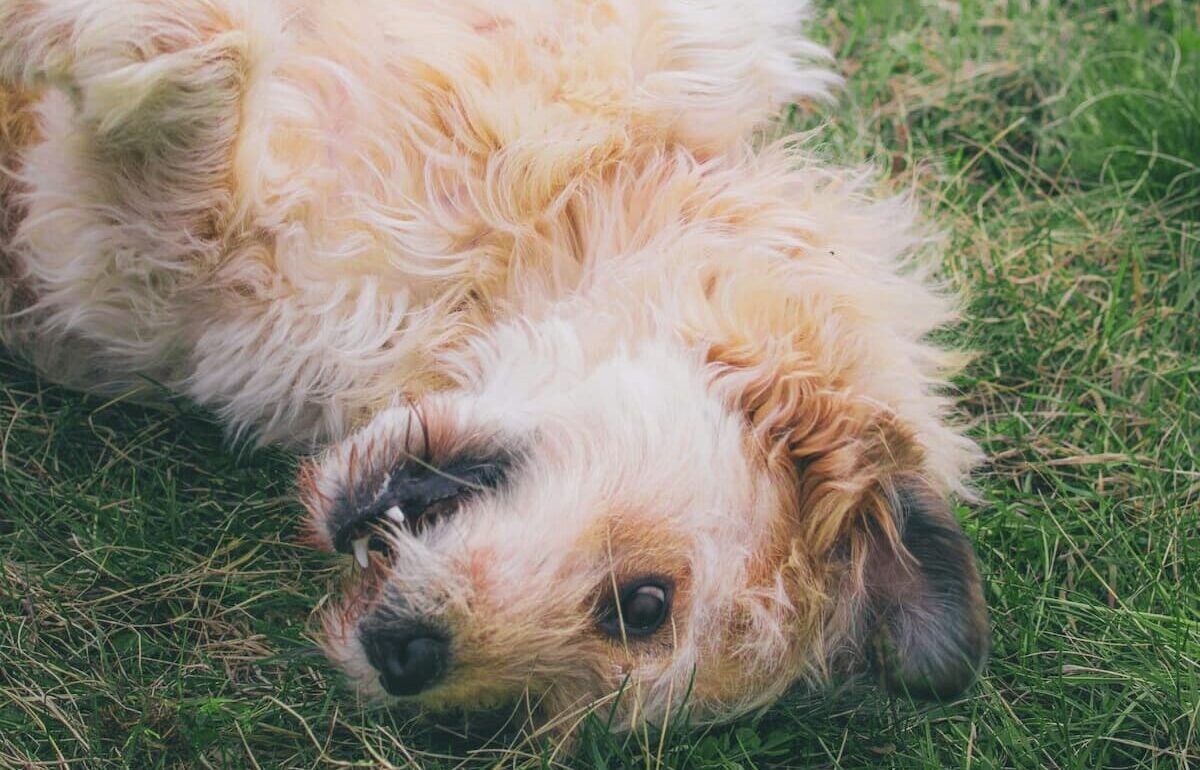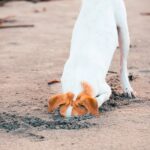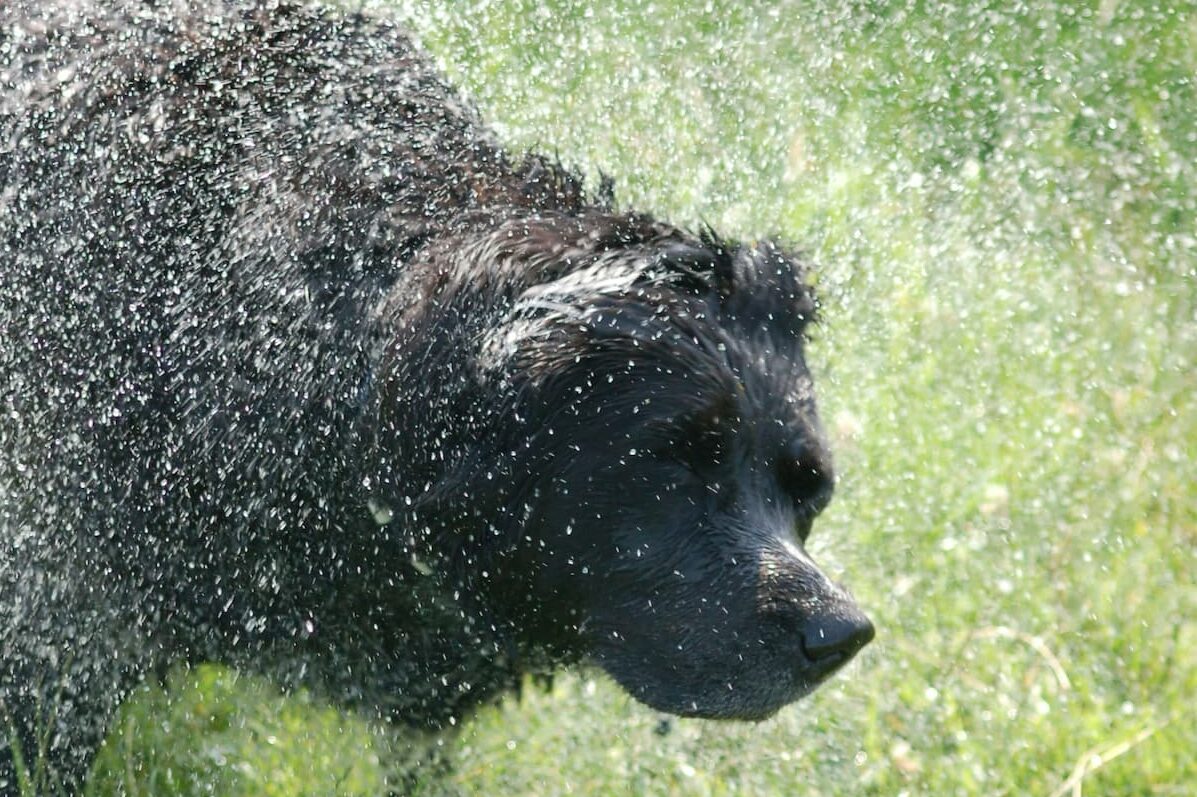Imagine this scenario: You’re sitting on your cozy couch, wrapped in a blanket, enjoying a peaceful evening at home.
Suddenly, your dog bounds through the door, full of energy, and promptly plops down next to you.
As you give them a loving pat on the head and scratch behind their ears, an unmistakable odor hits your nostrils – the unmistakable stench of “eau de wet dog.”
You can’t help but wonder, “Why do dogs smell when they come in from outside?”
Read on to find the answer.
The Explanation of Why Your Dog Smells After Coming Inside
Ever wonder why your furry friend always comes in smelling like they just rolled in something foul after being outside?
Well, it turns out, there are several reasons behind this common phenomenon.
Dogs have an incredibly acute sense of smell, and their adventures outdoors can expose them to an array of odors that we humans simply cannot detect.
From lingering scents on grass, to the enticing smells of other animals, it’s no wonder they come back with a unique aroma.
Another reason why dogs may smell after being outside is due to their own natural bodily functions.
Just like us, our four-legged companions sweat, but instead of through their skin, dogs release sweat through their paws.
While this might not be a major cause of the odor, combined with the dirt and debris they pick up while playing, it can contribute to that distinctive “doggy” smell.
Additionally, dogs have scent glands located near their anus, which can emit a musky odor when they defecate or mark their territory.
Other glands include the apocrine glands in their skin and the exocrine glands in their ears.
These release odorous chemicals that can mix with the smells they encounter outdoors.
So, when your dog comes back inside, it’s not just the environmental odors he’s bringing with him, but also a bit of his own personal scent cocktail.
Dogs also have a habit of rolling in things they find intriguing.
Whether it’s a patch of grass, a pile of leaves, or something a little more unsavory, dogs have a delightful (or perhaps not so delightful) tendency to roll their bodies in these substances.
This behavior not only provides them with entertainment but also helps them leave their own scent behind and mark their territory.
So, that pungent smell your pooch is bringing inside is essentially a part of their natural instinct!
Don’t forget that dogs have a naturally curious nature.
They love to explore their surroundings, whether it’s digging in the dirt, rolling in grass, or investigating other animals.
These activities can introduce them to all kinds of interesting scents, some of which may stick to their fur and become more noticeable when they come back indoors.
So, next time your beloved pup comes in with that distinct outdoor smell, remember that it’s just a part of being a dog and embracing their adventurous spirit!
Lastly, let’s not forget about the wonderful world of bacteria.
Yes, that’s right, bacteria play a part in your dog’s smell too.
Just like humans, dogs have a population of beneficial bacteria that live on their skin and help keep it healthy.
However, when your dog goes outside and rolls around in the grass or dirt, he’s introducing a whole new set of bacteria to his coat.
These bacteria can produce their own distinct odors, which can then mingle with the other scents your pup encounters and create a rather pungent perfume.
Tips for Reducing Your Dog’s Outdoor Scent
Have you ever wondered why your dog comes back inside smelling like the great outdoors?
It can be quite baffling, but fear not!
There are several tips and tricks you can try to reduce your dog’s outdoor scent and keep your home smelling fresh:
Grooming is key: Regular grooming sessions can help remove dirt, debris, and the outdoor odors that can cling to your dog’s fur.
Brushing your dog’s coat not only keeps it looking neat and tidy, but it also helps distribute their natural oils, which can help minimize odors.
Remember to use dog-friendly shampoos and conditioners that are specifically formulated to neutralize and eliminate smells.
Invest in odor control products: There are various odor control products available in the market that can effectively combat your dog’s outdoor scent.
Consider using scented sprays, powders, or wipes designed for pets.
These products can freshen up your dog’s coat and leave a pleasant scent behind.
Just be sure to choose products that are safe for your dog’s skin and avoid using anything that may cause irritation or allergic reactions.
Clean their belongings: Dogs love to roll around in the grass, dirt, and whatever else they can find outside.
To minimize their lingering scent, make sure to regularly clean their belongings such as their bedding, toys, and even their leash.
Using pet-friendly detergents and washing them on a regular basis can help get rid of any outdoor odors they may have brought home.
Maintaining Your Dog’s Cleanliness to Prevent Excessive Odor
Maintaining your dog’s cleanliness is key to preventing that lingering, oh-so-familiar odor when they come bounding in from outside.
We all know the scenario: your furry friend dashes around outdoors, gleefully rolling in grass, mud, or heaven knows what else they find.
While the source of the smell can vary, it’s important to address it for your dog’s overall well-being and your own nose’s happiness!
One of the main culprits behind the unmistakable scent is the accumulation of dirt and debris in your dog’s fur.
When they romp around outside, they pick up all sorts of particles that can cling to their fur, leading to an unappealing odor.
Regular brushing helps to remove these substances, keeping your pup’s coat clean and fresh.
Don’t forget to use a dog-friendly brush and be gentle, as not all dogs appreciate a vigorous grooming session!
Keeping your dog’s ears clean is another important factor in odor prevention.
Moisture and dirt can easily get trapped in their ears, leading to a distinctive smell.
Regularly check your dog’s ears for any signs of infection, such as redness, swelling, or a discharge, which can exacerbate the odor.
To clean their ears, use a dog-specific ear cleaner recommended by your veterinarian and gently wipe the outer ear with a cotton ball or soft cloth.
Remember, never insert anything into your dog’s ear canal, as this can cause injury.
Seek Professional Assistance for Persistent Smell Issues
While some dog owners might resort to giving their furry friends a quick bath to tackle the smell, it’s crucial to recognize that persistent odors may indicate an underlying issue that should be addressed by a professional.
A professional dog groomer or veterinarian will have the expertise to determine if there are any skin conditions, infections, or other health concerns contributing to the persistent smell.
Seeking their assistance can help ensure that your pup receives the appropriate treatment to alleviate any discomfort and eliminate those unpleasant odors.
Remember, our dogs rely on their sense of smell to explore the world around them, so it’s natural that they’ll occasionally come home with a noticeable aroma.
However, if the smell persists despite your efforts to address it, don’t hesitate to seek professional help.
By doing so, you can provide your furry friend with the necessary care, attention, and expert guidance needed to keep them smelling their best and ensuring their overall health and well-being.
FAQ
Q: Why do dogs smell when they come in from outside?
And why does that cause them to smell?
A: Great question!
You see, dogs have these amazing scent glands located in their paws that secrete a scent unique to each individual canine.
So, when they explore the great outdoors and trot through grass, dust, or even mud, the scents from these substances stick to their paws.
As they walk indoors, these scents tag along, causing their paws to carry an outdoor aroma.
Q: Is that the only reason?
A: Nope, that’s just part of the story!
Dogs also have sweat glands on their paws, and while sweating doesn’t play as significant a role in cooling them off as it does for us humans, it can contribute to the scent.
When dogs get a bit warm from playing or walking, these sweat glands produce moisture which can mix with the smells on their paws, intensifying the odor.
Q: Okay, so it’s primarily their paws that make them smelly?
A: Absolutely!
But here’s another interesting tidbit – besides the paws, dogs have scent glands in some other fascinating places.
One of them is their behinds!
Yes, you heard it right, their derrières.
These glands release an individualized odor that helps them communicate with other canines.
So, when your furry friend wanders outside, sniffs around, and discovers an intriguing smell, they may find it impossible to resist giving their behind a good sniff or two.
And that can add to their aromatic aura when they come back inside.
Q: Is there anything we can do to reduce the smell?
A: Sure thing! First things first, regular paw cleaning is a great habit to maintain.
After your pup returns from their outdoor adventures, grab a wet cloth or a specially formulated dog paw wipe (which you can easily find at pet stores) to give their paws a quick wipe-down.
This will help remove dirt, grime, and some of those pungent scents they picked up.
Also, maintaining good hygiene habits, such as regularly bathing your dog, can keep their overall odor in check.
Q: Should I worry if the smell seems unusually strong?
A: While a little doggy odor is normal, an unexpectedly intense scent might indicate an underlying issue.
Fungal or bacterial infections, allergies, or even diet can sometimes contribute to stronger smells.
If you notice anything out of the ordinary, it’s always best to consult your veterinarian for a proper check-up.
They’ll be able to determine if there’s a genuine cause for concern and provide the necessary advice or treatment.
Q: So, a smelly dog coming in from outside is just a sign of adventure?
A: Absolutely!
Dogs are curious creatures who love to explore and take in all the olfactory wonders the world has to offer.
So, when your four-legged friend returns with a distinct aroma, remember that it’s just their way of sharing their outdoor escapades with you.
Embrace it, laugh it off, and be ready for another adventure together!
Final Reflection
From the enticing aromas emitted by their fellow four-legged friends to the ever-present scents left behind by wildlife, it’s no wonder our dogs return home with a unique fragrance.
Their highly developed sense of smell is truly a marvel of nature, allowing them to explore and decode the world in ways we can only begin to imagine.
So while we may find ourselves occasionally cringing at the odor that lingers on Fido’s fur, let’s not forget to appreciate the wonders of their canine nose.
After all, it’s what makes them extraordinary beings, enriching our lives with their unwavering loyalty and unwavering curiosity.
Next time your furry friend comes bounding through the door, relish in their distinct scent and remember the incredible olfactory journey they just experienced.
And if you’re feeling up to it, why not take a moment to join them in exploring the world with a sniff or two of your own?
Who knows what hidden gems we may uncover under the guise of a simple smell!














